#Intervention Strategies
Explore tagged Tumblr posts
Text
Understanding and Overcoming the Yips in Baseball

The yips, a mysterious and frustrating phenomenon affecting athletes in various sports, particularly baseball, can have a devastating impact on performance. Characterized by involuntary muscle spasms, tremors, or freezing during skilled movements, the yips often manifest in throwing, pitching, or putting. Understanding the underlying causes and implementing effective interventions are crucial for helping athletes overcome this challenging condition.
The Multifaceted Nature of the Yips
Research suggests that the yips are influenced by a complex interplay of psychological, social, and neurological factors. This highlights the need for personalized interventions that address the unique needs of each athlete.
Psychological Factors
Fear of Failure: The fear of failure, amplified by negative self-perception and harsh social feedback, significantly contributes to the development and persistence of the yips.
Cognitive Fusion: Cognitive fusion, or the tendency to over-identify with thoughts and feelings, can exacerbate the condition. Athletes often get entangled in negative thought patterns, leading to increased anxiety and performance problems.
Negative Motor Imagery: Players with the yips exhibit higher levels of negative motor imagery specific to baseball throwing, suggesting an association between negative mental imagery and the yips.
Movement-Specific Reinvestment: Professional baseball players with the yips have higher levels of movement-specific reinvestment, indicating that an overemphasis on conscious control and monitoring of movements can disrupt automatic motor skills, leading to performance problems.
Neurological Factors
While there is no single muscle synergy pattern specific to all baseball players with yips, some individuals, especially those with dystonia, show unique muscle coordination patterns.
Treatment and Interventions
Personalized Approach: Treatments for yips should be tailored to the individual, as there's no one-size-fits-all solution.
Addressing Psychological Factors: Interventions should address psychological aspects like anxiety, fear of failure, and negative self-talk, which can contribute to negative motor imagery and the yips.
Cognitive Defusion Techniques: Techniques to reduce cognitive fusion, such as mindfulness and acceptance-based approaches, can help athletes detach from negative thoughts and feelings, reducing their impact on performance.
Supportive Environment: Creating a supportive coaching environment that emphasizes effort, improvement, and positive reinforcement can help reduce the occurrence of yips.
Motor Imagery Training: Both positive and negative motor imagery should be assessed in players with the yips, and interventions may incorporate motor imagery training to reprogram negative movement patterns.
Implicit Learning: Incorporating assessments of movement-specific reinvestment and creating training environments that foster implicit learning, where skills are acquired through unconscious processes, may help prevent or manage the yips.
Ventro-oral Thalamotomy: For cases where dystonia is the underlying cause and other treatments fail, ventro-oral thalamotomy can be a successful treatment for task-specific dystonia in athletes, potentially saving their careers.
The yips in baseball are a complex and challenging condition, but with a comprehensive understanding of the underlying factors and the implementation of personalized interventions, athletes can overcome this obstacle and regain their peak performance. By addressing the psychological, social, and neurological aspects of the yips, coaches and sports psychologists can help athletes regain confidence, reduce anxiety, and rediscover the joy of playing the game.
PASS's Services:
Annual Guidebooks: PASS publishes annual guidebooks for various sports, summarizing the latest research and providing practical recommendations for training and performance optimization.
Custom Reports: PASS offers custom reports that delve deep into specific performance challenges, providing tailored solutions based on the latest scientific evidence.
Researcher Exchange: PASS facilitates workshops and Q&A sessions with leading sports scientists, allowing coaches and athletes to gain valuable insights and connect with experts in the field.
The potential of sports science to revolutionize training and performance is vast, but it remains largely untapped in many areas of athletics. By embracing research-backed principles and utilizing the services of organizations like PASS, coaches and athletes can unlock new levels of performance, reduce the risk of injuries, and achieve their full potential.
About PASS | Practical Application of Sport Science:
PASS helps top sports teams make better decisions using science. The teams ask questions like: “how to manage workload; how to improve decision-making; what is an optimal periodization program”. PASS takes a deep dive into all relevant research articles, figures out what's useful, and gives the teams specific advice they can immediately implement – only things that have been scientifically proven.
Explore the resources available at PASS (https://sportscience.pro/) and discover how sports science can transform your approach to training and performance.
#athletic performance#sports science#PASS#baseball psychology#sports psychology#yips#basebal#performance anxiety#mental blocks#neurological factors#intervention strategies
0 notes
Text
Comparative Analysis of Blights: Early Blight, Late Blight, and Gummy Stem Blight
In the field of plant pathology, the ability to differentiate between different diseases is essential for efficient crop management. This article examines the traits that differentiate Early Blight, Late Blight, and Gummy Stem Blight. Early Blight Early Blight, caused by the fungus Alternaria solani, is a common disease that affects a wide range of plants, particularly those in the Solanaceae…

View On WordPress
#Agricultural challenges#Agricultural Environment#Agricultural Landscape#Blights#Comparative Analysis#Concentric Ring Pattern#Crop Health#Crop Losses#Crop management#Crop Protection.#Diagnostic Traits#Disease Characteristics#Disease Differentiation#Early Blight#Growers#Gummy Stem Blight#Intervention Strategies#Late Blight#Lesions#Plant Pathology#Prompt Response#Resilient Farming#Timely Identification#V-Shaped Blight Pattern#Visual Indication#Water-Soaked Appearance
0 notes
Text
Merits of Alumni Feedback in Higher Educational Institutions
In the perpetually evolving landscape of higher education, one cannot underestimate the influence wielded by alumni relations. Alumni represent the juncture linking the past and the present, bridging those who once traversed the revered halls of an institution with those presently gracing its precincts. These associations, constructed upon shared experiences create an unique identity. These…
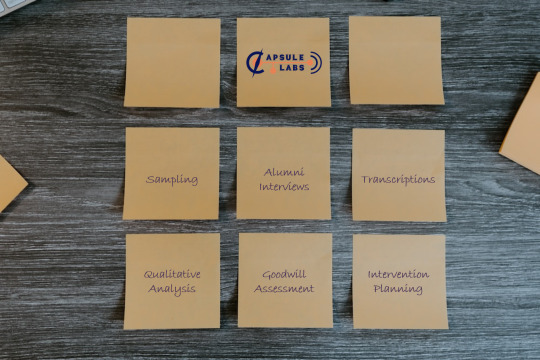
View On WordPress
#Academic Delivery#Alumni Assessment#Alumni Employment#Alumni Feedback#Alumni Relations#Brand Ambassadors#Capsule Labs#Education Policy#Educational Institutions#Higher Education#Institutional Excellence#Intervention Strategies#Management Consultancy#Promotional Activities#Reputation Management
0 notes
Text


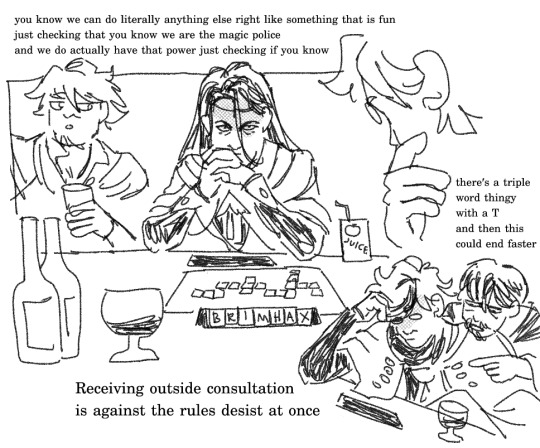
the scrabblers and their bored boyfriends
#witch hat tag#orufrey#small post cause i'm in a bad non-drawing mood. 'tis the way of the lunarharp#they're regretting not having joined in bc then it would end faster but theyve learnt that the tediousness#of Mr Checking The Rules Constantly To Catch You Out vs Mx I'm Not Competitive.(<- True) However if I Lose to Easthies i will actually Die.#combine to make it SLIGHTLY less boring to just drink beer nearby. they got assigned double date duty by the government btw so they gotta.#bel and vinanna's intervention strategy to avoid bloodshed such as in chapter 80 perhaps#this happened after “Er You're Drinking a Mad Witch's Brew cocktail when youre a caretaker to children? *sips his pathetic juice*” incident
145 notes
·
View notes
Text
Listen the battle episodes of junior year are simply some of my fave battle eps ever, I'm rewatching the last stand right now and man I'll never get over how ridiculously competent each and every one of them are, they're so hot for real for real
#dimension 20#d20#fantasy high junior year#fhjy#I rarely watch battle eps okay and when I do it's usually not for the battle moves#(like I rewatch the unsleeping city finale for Siobhan talking to the American dream)#(or the unsleeping city 2 finale for that insane divine intervention - not usually for the mechanics)#but this? I'll never get over Siobhan's scatter#Simply taking control of the battlefield#like the last stand specifically is sooo good#bc it showcases their skills both in and out of universe with the tests y'know? Siobhan and Emily slamming out that Limerick in 20 secs?#so fucking awesome#and it also is very clearly strategy and not just dice luck#but it's also dice luck! Like the players are doing amazing and the characters (bc of the dize) are also doing amazing
34 notes
·
View notes
Text
im goign to cook somehting weird and strange and i might get killed but at least im having fun
#sorry thisis not about Ren it's about girls again...#if nobody is going to do it then im going to do it!!! I'll feed myself#im trying to do my research as always. actually it's not even that bad (if i don't fuck up)#its going to take a while i think.. so im just talking bc im excited and not bc it's coming soon#lets go me not talking about what im doing you go girl give us nothing#it's bc i don't know if I'll succed so if i end up not doing it I'll just dissapoint myself and nobody else you knwo#i think about everything this is a strategy my mastermind plan... <- going crazy from loss of sleep#silly squeaking time#WAIT WHITE DAY IS NEAR I HAVE NOTHING AGAIN you know what i'll just post ocxcanon again im so sorry#that's everything i have left bc is everything i draw when im feeling bad#you know whaatt i could run the queue that day and i dissapear ok hope i don't forget again i need divine intervention
8 notes
·
View notes
Text
Inspired by a bizarre argument I had on reddit,
I think the question comes down to whether the word "treatment" encompasses strategic behaviors for lessening negative outcomes that result from ADHD symptoms or if treatments are meant to alleviate the symptoms themselves.
#adhd#I don't expect to get many replies#but having dozens of strangers confidently tell me that making a list is a treatment#like I associate treatment with medical intervention#if making lists is a treatment#I've been self-treating since I was 10#like I got away with my ADHD for a long time because I had so many strategies for dealing with my symptoms#but it didn't mean I didn't have ADHD#it just meant other people weren't having to deal with the drawbacks of my ADHD#so it the treatment for me or for others#is the root or the outcome the thing that needs intervention#does this matter on more than a philosophical level?#anyway
54 notes
·
View notes
Text
Breaking the Silence: Creating Safe Spaces for All

View On WordPress
#accountability#addressing harassment#advocating for safety#allyship#anti-bullying policies#anti-violence initiatives#awareness#behavior change#breaking barriers#breaking the silence#building self-esteem#bullying intervention#bullying intervention strategies#bullying prevention#calling in#calling out#changing perceptions#coaching youth#combating discrimination#combating social norms#Community Action#community support#conflict resolution#consent#creating awareness#creating safe spaces#crisis intervention#diversity#educational tools#emotional health
2 notes
·
View notes
Text
when i was in a level psychology my teacher once asked my class how long we thought we had left before our species went extinct. most of us gave variations in the realm of thousands of years, but my friend said it would be within this century. when we asked her why she just said 'idk i just don't think we're going to last much longer' and we all laughed it off and said she was just being pessimistic. but now i see the way the world is absolutely refusing to respond to climate change the way it needs to and i think she was right.
#i am a sustainability consultant#i calculate carbon footprint#develop net zero strategies#put together impact assessments related to climate change#ive had clients tell us that they literally don't care about reducing their carbon footprint#ive had clients saying that the board doesnt want to approve the funding needed for the interventions we've recommended#ive had clients who very clearly only care about their project so far as it ticks a box#it's so demoralising#climate change
13 notes
·
View notes
Text
Visual Diary 2: Wicked Problems
Horst Rittel uses the term “wicked problems” to describe problems that are more important and have higher significant issues. These problems are inherently unsolvable. I believe that education reform is an example of a wicked problem. The current world that we live in is rapidly changing. Every year it seems like we are finding ourselves adapting to new changes, and ways of being. In the world of education, it feels as if we are behind in some ways. We need to create and ensure an equal opportunity and level of education and preparedness for all students.

2 notes
·
View notes
Text
Visual Diary #2 - Wicked Problems: Technology Usage

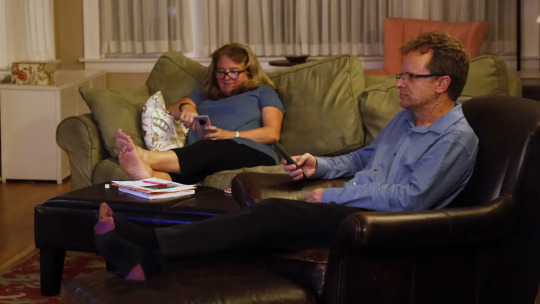
How can we encourage individuals to reduce their reliance on personal devices, especially during moments with partners, families, and/or during meals? I am guilty of this wicked problem and notice myself wanting to change my habits. AS technology and phone addictions have increased, I find myself less present during meals, wanting to reach for my phone or thinking about what is going on in the social world. I have found myself needing to create intentional, phone-free times when with my partner to have a more enriching and deeper conversation.
3 notes
·
View notes
Text
Early Signs of Schizophrenia and Prevention Strategies!
Schizophrenia, a complex and often misunderstood mental disorder, affects millions of individuals worldwide. It is characterized by a range of symptoms that impact thoughts, emotions, and behavior. While the exact cause of schizophrenia remains elusive, early detection and intervention are crucial for managing the condition effectively. In this article, we delve into the early signs of…
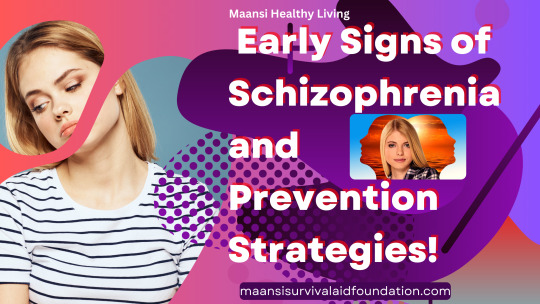
View On WordPress
#Cognitive health#Early detection#Early intervention#Mental health awareness#Mental health education#Mental health prevention#Mental health promotion#Mental health support#Mental wellness strategies#Preventing schizophrenia#Psychiatric disorders#Psychosis signs#Schizophrenia awareness#Schizophrenia risk factors#Schizophrenia symptoms
3 notes
·
View notes
Text
While, yes, there is evidence of this being some of the case, I think it's important to also consider two important things: where the company who produced this source sit and how much of what's out there was propaganda for Russia or by others (and how this may somewhat overlap considering anti US government sentiment is something shared by both the Russian government AND US communists who are legit leftists).
So who owns WIRED? How reliable is it and how much weight should this article be given? The simple answer is, yes, it's all true, but also we have to be aware of the framing of this article and, most importantly, what is being omitted and what is being highlighted. There was absolutely interference in the 2016 election, this has also been proven in courts and in other sources beyond just the one given, so WIRED absolutely checks out with its facts as being true. However, not everyone who had this opinion was a Russian spy and certainly people who hated and still hate Hillary are Russian spies at all. However, many are leftists who are radical communists or anarchists who hold an agenda similar to that of Russia; the growth of communist ideologies and anti us government sentiment.
That reflects today and it's not only true for the US, but for Palestine as well. For those unfamiliar, Russia has been pushing (along with China) for a single state solution for Palestine and have been very aggressively anti Israel. This isn't because what Israel is doing is wrong though, this is because Israel is aligned with the USA and NATO, which is exactly what Russia's target was during election interference in the USA before and would be once again today. It's entirely to undermine the capitalist/ liberal USA government and always has been since even the Vietnam War and the Cold War.
What needs to be considered in this case is this then; is it an enemy of the capitalist system only or the existence of the USA at all? Would a new purely leftist government taken through revolution be Russia's goal, or the destruction of the government in order to win in a war? I actually don't know, but I do know that I can agree that democrats have committed horrific acts to keep NATO existing and that NATO itself is an imperialist power.
This is where a lot of nuance comes in here, do we accept that there is Russian propaganda that happens to align with leftist ideals or do we reject our own ideals because we don't want to confirm to Russian interference? It's hard to know what way is the "right" way since there is a lot of geopolitical factors at play here. It's hard to know what would be the overall best. Ultimately, I think it depends what type of future we, as individuals, want for the USA. If you're a Trotskyist, for example, you may align with Russia's perspective already since you already happen to believe in the same ideologies. Likewise, you may be against the fall of the government overall and want internal change through peaceful means and no use of force, which means voting blue anyway regardless of who it is even without this interference or knowledge of it. I think, in this way, as much as it is important to know all of this, it isn't as earth shattering as one might think at first glance. There's nuance and context behind it that, when you think about it, isn't all that surprising.
Essentially, it really depends on your beliefs and how ""susceptible"" to said propaganda you are. Especially since this propaganda isn't just "Russian propaganda" but specifically communist propaganda, which will push people into being radicalised into far left circles, which...isn't really a bad thing depending on where you sit. Of course, this isn't for everyone and those who are more centrist/ moderates would see it as a very bad thing for so much far left propaganda to exist and push for revolution. And overall, of course, both sides would have at least some concern that it's from a foreign country, no matter how inevitable it is due to the geopolitical context that said country would do this in any situation that could radicalise people into communism.
For people who don't remember the 2016 Tumblr was full of Russian trolls who posed as progressive social justice blogs and urged young liberals to throw their vote away on a third party. You can read more about it here :https://www.wired.com/story/tumblr-russia-trolls-propaganda/ This camapign was extraiordinary succesful and third party voters were a key reason why Trump one( if you look at the electoral results you will see that the race was so close that if the third party votes had gone to Hillary she would have easily buried Trump) Sadly we didn't know that this was a orchestred camapign until Tumblr released the data itself and told us who the blogs were. Those were not simple spam blogs. They were pros. They knew how to talk to people, they made real posts and interacted. They tried this in 2020 but we were wary because the memories were still fresh But now thy are trying again. I just found this guy who is running the EXACT same play book as in 2016. Pretending to be a person of color , poting progresive posts while at the same time urigng everyoe to vote third party. As soon as I called him out he immedately blocked me beause he knew I outed him. So now i's up to you guys. Don't let Trump supporting Russian trolls run their psy ops here. Report en masse and get them now instead of waiting for months for tumblr to tell us they worked for Trump REPORT THIS RUSSIAN TROLL NOW. DON'T LET THEM PULL THEIR GAMES AGAIN: https://www.tumblr.com/decolonize-the-left
#sorry for the long ramble but context is important and I think this gives people extra information to decide where they want to sit#I personally agree with this specific thing so I may be somewhat biased#That being said I am against Russia's push to aquire power and (unlike the Trotskys I know) I se Russia as an imperialist power as well#I don't trust Russia but I can at least agree that we share some ideologies and anri US gov sentiment is one of them#I would personally still push to have a revolution and for further radicalisation because capitalism is a cancer that's killing our world..#but also implementing preventions against Russia and a strategy to stop them from becoming too confident when one imperialist competator is-#- eliminated.#I think preparing for interventions to prevent Russia's imperalism is important but that shouldn't mean compromising on a revolution#since we do legitimately need one since yeah the USA is just as bad if not worse when it comes to imperalism and corruption.#The optimistic result would be a strong communist party in the USA that is so anti imperialist that they can remain strong and independent#Even more preferable would be a revolution that returned sovereignty to the rightful Indigenous people of the land.#It would be great if the revolution was by and for them but idk if there'd be enough numbers for a successful revolution in that case.#I at least hope that they'd be the ones to lead since there's no anti imperalism until the country is decolonised and the land is returned.#but yeah I think I made my point anyway
5K notes
·
View notes
Text
Therapy Treatment for Depression: Finding Hope and Healing
Did you know that nearly 21 million American adults experienced at least one major depressive episode in 2020? Depression is not just a passing mood, but a serious mental health condition. It impacts millions of lives every day. Finding the right therapy treatment for depression can be a transformative journey toward healing and recovery. Your mental health matters, and professional therapy…
#Cognitive Behavioral Therapy (CBT)#Coping Strategies for Depression#Depression Treatment Options#Evidence-Based Therapy#Mental Health Support#Mindfulness Practices#Psychological Interventions#Therapy for Depression
0 notes
Text
Aba Therapy Bradford Ontario

Bradford, Ontario's autism behaviour consulting and caregiver-mediated early years program deliver targeted support for early childhood growth and learning.
#ABA therapy for children#Behavioural Therapy In Bradford#Naturalistic Developmental Behavioral Intervention#Aba Strategies For Parents#aba Therapists Bradford
0 notes
Text
Mitochondrial Dysfunction Drives Cognitive Decline
Introduction
Mitochondria, often referred to as the powerhouses of the cell, are crucial organelles responsible for energy production through adenosine triphosphate (ATP) synthesis. Beyond their well-known role in energy metabolism, mitochondria regulate a wide range of cellular processes, including calcium homeostasis, reactive oxygen species (ROS) generation, and apoptosis. When mitochondria malfunction, the consequences can be far-reaching, especially for energy-intensive organs like the brain. Recent research highlights mitochondrial dysfunction as a central factor in cognitive decline, contributing to neurodegenerative diseases such as Alzheimer’s, Parkinson’s, and Huntington’s disease. This article explores the mechanisms by which mitochondrial dysfunction impacts cognitive function and discusses potential therapeutic strategies.
The Brain's Energy Demands and Mitochondrial Function
The human brain, despite accounting for only about 2% of body weight, consumes approximately 20% of the body’s energy. Neurons, the primary cells of the nervous system, rely heavily on mitochondrial ATP to sustain synaptic activity, ion gradient maintenance, and neurotransmitter synthesis. Efficient mitochondrial function is critical for maintaining neuronal health and connectivity, which are foundational for learning, memory, and other cognitive processes.
Mechanisms of Mitochondrial Dysfunction in Cognitive Decline
Reduced ATP Production: Mitochondria produce ATP through oxidative phosphorylation (OXPHOS) in the electron transport chain (ETC). Damage to ETC components, often caused by genetic mutations or oxidative stress, can reduce ATP production. Energy-starved neurons may fail to maintain synaptic function, leading to cognitive impairments.
Excessive ROS Generation: While ROS are natural byproducts of mitochondrial activity and play roles in cell signaling, excessive ROS can damage mitochondrial DNA (mtDNA), proteins, and lipids. This oxidative damage exacerbates mitochondrial dysfunction, creating a vicious cycle that contributes to neuronal degeneration.
Impaired Calcium Regulation: Mitochondria help buffer intracellular calcium levels, which are critical for neurotransmitter release and synaptic plasticity. Dysfunctional mitochondria may fail to regulate calcium, leading to excitotoxicity—a condition where excessive calcium causes neuronal injury and death.
Mitochondrial Dynamics: Mitochondria constantly undergo fission (division) and fusion (joining) to adapt to cellular demands and maintain their integrity. Imbalances in these processes can result in fragmented or overly fused mitochondria, impairing their function and transport within neurons.
Mitochondrial Transport Defects: Neurons have long axons and dendrites that require efficient transport of mitochondria to regions of high energy demand, such as synaptic terminals. Dysfunction in mitochondrial transport mechanisms can disrupt synaptic activity and contribute to cognitive decline.
Mitochondrial Dysfunction in Neurodegenerative Diseases
Alzheimer’s Disease (AD): Mitochondrial dysfunction is a hallmark of AD. Amyloid-beta plaques and tau tangles, characteristic of AD, have been shown to impair mitochondrial function. Elevated ROS levels and reduced ATP production exacerbate neuronal loss and cognitive decline in AD.
Parkinson’s Disease (PD): PD is associated with mutations in genes like PINK1 and PARKIN, which regulate mitochondrial quality control. Impaired mitophagy—the process of removing damaged mitochondria—leads to their accumulation, contributing to dopaminergic neuron degeneration and motor as well as cognitive deficits.
Huntington’s Disease (HD): In HD, mutant huntingtin protein interferes with mitochondrial dynamics and function, resulting in energy deficits and increased oxidative stress. These mitochondrial abnormalities contribute to the progressive cognitive and motor decline observed in HD patients.
Diagnostic and Therapeutic Approaches
Biomarkers of Mitochondrial Dysfunction: Advances in molecular biology have identified potential biomarkers, such as altered mtDNA levels, ROS, and metabolites associated with mitochondrial pathways. These biomarkers can aid in early diagnosis and monitoring of neurodegenerative diseases.
Pharmacological Interventions:
Antioxidants: Compounds like coenzyme Q10, vitamin E, and MitoQ target mitochondrial ROS, reducing oxidative damage and preserving mitochondrial function.
Mitochondrial Biogenesis Enhancers: Agents like resveratrol and PGC-1α activators promote the production of new mitochondria and improve mitochondrial health.
Calcium Modulators: Drugs that stabilize calcium levels, such as memantine, may protect neurons from excitotoxicity.
Gene Therapy: Gene-editing tools like CRISPR/Cas9 offer potential to correct mtDNA mutations or enhance the expression of genes involved in mitochondrial quality control. For example, boosting PINK1 or PARKIN expression could improve mitophagy in PD.
Lifestyle Interventions:
Dietary Interventions: Ketogenic diets and intermittent fasting have been shown to enhance mitochondrial function by promoting efficient energy utilization and reducing ROS.
Exercise: Regular physical activity stimulates mitochondrial biogenesis and reduces oxidative stress, offering neuroprotective benefits.
Sleep Optimization: Adequate sleep is essential for mitochondrial repair and the clearance of damaged proteins, such as amyloid-beta.
Future Directions in Research
Understanding the interplay between mitochondrial dysfunction and cognitive decline opens new avenues for research and therapy. Emerging technologies, such as single-cell transcriptomics and advanced imaging, allow for detailed exploration of mitochondrial dynamics in neurons. Additionally, the development of mitochondria-targeted drugs and nanotechnologies holds promise for precise therapeutic interventions.
Conclusion
Mitochondrial dysfunction plays a pivotal role in driving cognitive decline and is implicated in the pathogenesis of various neurodegenerative diseases. Addressing mitochondrial health through targeted therapies, lifestyle modifications, and early diagnostic measures offers hope for mitigating cognitive impairments and improving quality of life. As our understanding of mitochondrial biology deepens, so too does the potential for innovative treatments that could transform the landscape of neurodegenerative disease management.
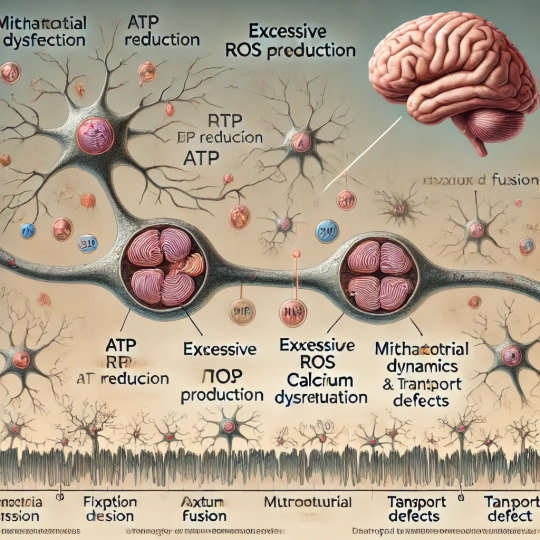
#Mitochondrial dysfunction#Cognitive decline#Neurodegenerative diseases#Alzheimer\u2019s disease (AD)#Parkinson\u2019s disease (PD)#Huntington\u2019s disease (HD)#ATP production#Oxidative phosphorylation (OXPHOS)#Reactive oxygen species (ROS)#Mitochondrial DNA (mtDNA)#Calcium homeostasis#Synaptic activity#Excitotoxicity#Mitochondrial dynamics#Mitochondrial fission and fusion#Mitophagy#Mitochondrial transport#Biomarkers#Antioxidants#Mitochondrial biogenesis#Gene therapy#CRISPR/Cas9#Lifestyle interventions#Ketogenic diet#Exercise#Sleep optimization#Neuronal health#Therapeutic strategies
0 notes